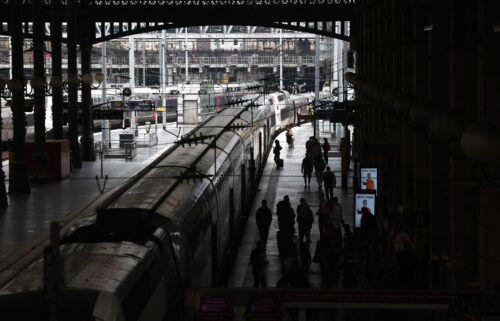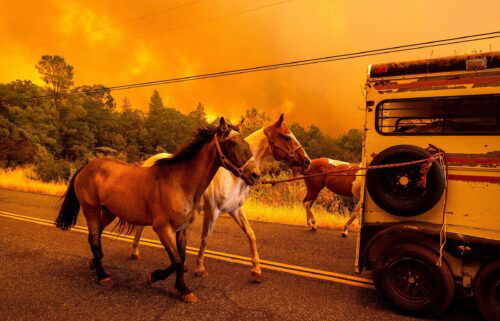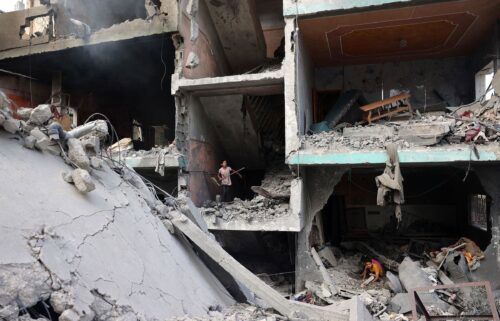Hip-hop artists unite for historic project on centennial of Tulsa Race Massacre

Click here for updates on this story
TULSA, Oklahoma (Tulsa World) — Fire has a voice. You’ll soon be able to hear it. Oklahoma hip-hop artists are uniting to commemorate the centennial of the 1921 Tulsa Race Massacre with a multimedia project titled Fire in Little Africa.
Rappers, singers, producers, poets, musicians and visual artists are teaming up with the intent of bringing the community together in the spirit of Black Wall Street. Bonus: Participation in the project will introduce Oklahoma hip-hop figures to the world.
Produced with support from the 1921 Tulsa Race Massacre Centennial Commission, the Woody Guthrie Center and the Bob Dylan Center, Fire in Little Africa (fireinlittleafrica.com) features a hiphop album, a documentary, a podcast and an educational curriculum. Among recording sites: The Skyline Mansion, a former home of Tate Brady, a prominent early Tulsan who was known to be active in the Ku Klux Klan.
Prior to the May 28 Fire in Little Africa release date, let’s hear from a few contributors. Bio information is courtesy of Marketing Director Chris Davis.
1ST VERSE (rapper) is one of the true legends of the Tulsa hip-hop scene. He helped build the foundations of the scene that thrives today within the influential Oilhouse Collective circa 2010. His debut album (“The City That Always Sleeps”) is a local classic. Verse is so well-loved in Tulsa that he released his “VSXO” album in 2019 after a threeyear hiatus and sold hundreds at $30 each.
Why is the Fire in Little Africa project important to you?
The Fire in Little Africa project is important to me first and foremost because of its ability to speak to the history of Tulsa and Greenwood specifically, with the race massacre as the most eye-catching part of the story that draws people in. I think it can and will open up conversations about Tulsa and American history that need to be engaged in. It can and will usher in more hiphop that engages with culturally and historically relevant issues, the likes of which we saw more of in the late ‘80s through the early ‘90s.
How would you describe the Tulsa hip-hop scene and its artists?
I would describe the hip-hop scene as a melting pot of different musical influences — and as one of the best in the country and history of hip-hop. The music is the most important part to me, and it’s as good here as it has ever been anywhere. The artists that comprise the scene have an investment in and love for their city and each other. I believe Tulsa’s hip-hop artists are poised for this moment and putting in work to make Tulsa look really good for years to come.
STEVIE “DR. VIEW” JOHNSON (producer/executive producer) is a producer, DJ, educator and community organizer from Longview, Texas. Johnson received his Ph.D. in higher education administration from the University of Oklahoma in May 2019. His dissertation (“Curriculum of the Mind: A BlackCrit, Narrative Inquiry Hip Hop Album on Anti-Blackness & Freedom for Black Male Collegians at Historically White Institutions”) received the 2019 Bobby Wright Dissertation of the Year Award for the Association for the Study of Higher Education. Johnson is the manager of diversity and education outreach for the Woody Guthrie Center and Bob Dylan Center.
Why is the Fire in Little Africa project important to you?
It’s important because it’s an opportunity to tell untold, buried histories that have affected a lot of people — not just Black folks, but the white people too. I just think it’s an opportunity for us to really sit and try to heal our traumas and hopefully create some social commentary. Obviously, hip-hop is the vehicle, but I think moreso it’s just a tool for us to really sit down and understand how we can communicate effectively. I think Fire in Little Africa is not even a project anymore. It’s a movement, and that’s just me saying it basically on the evolution of what I have seen. We have literally made something out of nothing in a pandemic, and we are still moving along and I’m starting to notice that the community aspect is the critical piece of how this thing has been able to be sustained over time. I just think this is important. Obviously, it is 100 years (since the massacre), but it is an opportunity for us, as the city of Tulsa and the state of Oklahoma, to hold ourselves accountable and have real conversations around race, but also find hopefully some strategies of how we can come together and make this state and make this nation a better place. I think the massacre and things that have been happening in Tulsa the past couple of years, and obviously recently with the mayoral election, were really just a small microcosm an example of what is happening in America. I think with anything, Black culture has always been around those conversations. Tulsa hip hop is a part of that and honestly, in my opinion, is the driving force for this kind of cultural movement. I think it’s a critical piece. This is not just an album. It’s not a project. It’s a movement, but it’s also a legacy project. We are really asking ourselves what we want Tulsa or Oklahoma to look like 100 years from now and how does this project speak to that?
How would you describe the Tulsa hip-hop scene and its artists?
It’s communal. That’s probably the biggest word is “communal.” I think it’s a reflection of Black Wall Street — the Black Wall Street that people kind of think about. From the South perspective, in hip-hop, that has always been ingrained in us, but I think Tulsa specifically it is the type of environment where we don’t have a lot of studio space and we don’t have a lot of production film sets. We really have to enroll ourselves in YouTube University and just figure it out. A lot of it is bartering resources. We are not in a position like New York and L.A. and Chicago and Atlanta. It really is not like a crab in a barrel. It’s more like all the crabs and trying to get out and (help) each other out of the barrel. It’s definitely communal. It’s relational. For me it’s not even just about the music that is created. It’s the stories that are being told and how artists are allowing me, as an executive producer, to be a part of the story they are trying to tell. Fire in Little Africa is a prime example of that. So to answer you question, the Tulsa hip hop scene is communal. But it really is like, hey, I know where you stand. I know your people. I know your kids. I know where your kids go to school. We probably go to the same type of functions. So it is like a family atmosphere that I don’t think a lot of cities would be willing to cherish it the way that we do.
HAKEEM ELI’JUWON (rapper) is one of the most respected spitters in Oklahoma. His Native American ancestry gives him a unique perspective, and he is an expert on the tribal history of Oklahoma and beyond. He often explores these uniquely Oklahoman themes like cowboys and Indians as they relate to the street culture he often represents. His debut album (“Captain”) dropped in 2020 to universal praise.
Why is the Fire in Little Africa project important to you?
Fire in Little Africa is an important project for me because I know that the legacy of Black Wall Street will live forever through the work we are putting in now. I’m getting to put my stamp on my city. People will never forget that I was here and I was a part of this. Whenever kids look back on the album, they will be able to say Hakeem Eli’Juwon was one of the artists that was considered one of Tulsa’s premier artists at at the time, and that’s pretty much what the importance is for me is bringing back the energy of Black Wall Street and the outstanding, everlasting legacy of it.
How would you describe the Tulsa hip-hop scene and its artists?
I would describe Tulsa’s hip-hop scene as diverse. There are so many different ways that you can approach the game, and the way Tulsa is approaching the game right now is more unified than people will give it credit for. But right now, I would describe Tulsa as diverse and energetic. There’s just a creative energy here and that creative energy is powerful.
SNEAK THE POET (rapper/filmmaker/executive producer) is a filmmaker, rapper and poet from north Tulsa. The director of the “Fire In Little Africa” documentary, Sneak contributes to Fire in Little Africa in myriad ways. He just released a new album (“Daydreamer”) that features Steph Simon, Dialtone and other Fire in Little Africa artists.
Why is the Fire in Little Africa project important to you?
Fire in Little Africa is important to me because it’s giving a platform for Tulsa’s hip-hop scene to be recognized at a national level. I’ve been friends with and worked with a lot of these artists over the last 10 years. This is our stamp on the culture. It’s going to launch a lot of careers, and we’re shining light to the history and legacy of Black Wall Street and delivering it in such a powerful way. The magnitude and timing of this project is nothing short of divine.
How would you describe the Tulsa hip-hop scene and its artists?
We have a vibrant scene here, almost cartoon- or anime-like. You get a little bit of everything in the town. There’s a lot of different characters out here, but it’s genuine. Artists have no problem collaborating. That’s probably my favorite part about the scene here. People really get inspired by other artists doing their thing and be like, “I wanna rap.” I feel like I hear about a new rapper every day and I think that’s lit. But we’re no rookies at this. A lot of artists have been established in the town for well over 10 years making their mark when the scene was just one block.
STEPH SIMON (rapper/executive producer) has been telling the story of Greenwood in his music since his 2019 album, “Born on Black Wall Street.” He often refers to himself as “Dicky Ro” and says he channels the spirit of Dick Rowland — the shoe shiner accused of attacking a white woman in an elevator to set off the events of the Tulsa Race Massacre. In 2019, Simon partnered with childhood friend and former NFL running back Felix Jones to create Skyline Star Records. Simon also created the largest hip-hop festival in Oklahoma, the World Culture Music Festival.
Why is the Fire in Little Africa project important to you?
Fire in Little Africa is important because it’s just our time. You can feel it in the air. A lot of attention has been on Tulsa for so many different reasons, but with Fire in Little Africa, the world is about to get homegrown representation. We get to show the world how talented we have been for years.
How would you describe the Tulsa hip-hop scene and its artists?
Our hip-hop scene and just the music scene in general is community. Everybody knows each other and works with each other. We cross genres and we do whatever feels right with our sound because we have control over it. Everything is us.
AYILLA (singer/rapper) channels deeply spiritual divine feminine energy in her sultry neo-soul hip-hop sounds, like on her 2020 EP “Witch Tape.” Also an entrepreneur, Ayilla opened LoveMore Hookah lounge in Tulsa’s Kendall-Whittier neighborhood in 2020.
Why is the Fire in Little Africa project important to you?
Fire in Little Africa is important because this happened where I grew up and I knew little about it. It’s a dark history that our town has covered up for a long time, and music is the perfect way to shed light on it. It’s also important that the story is being told from the perspective of the individuals who are the current Black entrepreneurs and artists of Tulsa today. The karma will be our success.
How would you describe the Tulsa hip-hop scene and its artists?
We have so much untapped talent here; it truly is fascinating. We have every style of hip-hop, all its sub genres, and the talent to go with it. There is an energy from the past that I know is in every Black creative in Tulsa. It fuels us.
Please note: This content carries a strict local market embargo. If you share the same market as the contributor of this article, you may not use it on any platform.



